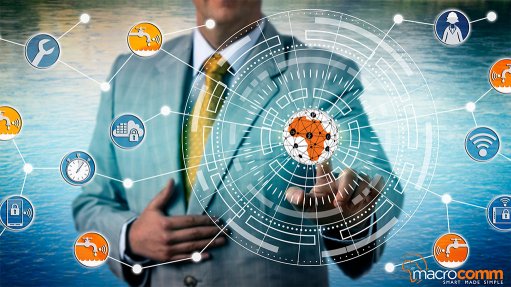
Macrocomm's Internet of Things technologies facilitate sustainable water use
Measuring the flow of water through its cycle of collection, storage, distribution, consumption, and purification is foundational to enabling a data-driven and analytical approach to water management and usage in various industrial, commercial, residential and public sector segments, says Macrocomm Group CEO Sivi Moodley.
Moodley highlights the United Nations ‘World Water Report 2021’, which cited the following trends on future water usage:
- The 2030 Water Resources Group (2009) concluded that the world would face a 40% global water deficit by 2030 under a business-as-usual scenario.
- The Organisation for Economic Cooperation and Development (2012) projected that global water demand would increase by 55% between 2000 and 2050.
- Burek et al. (2016) estimated that global water use would likely continue to grow at an annual rate of about 1%, resulting in an increase of 20% to 30% above the current level of water use by 2050.
Internet of Things (IoT) technologies can be applied in various ways to enable the sustainable use of water, including:
- Leakage detection
- Efficient, data-driven systemic water management
- Water quality and safety monitoring
- Quality control on water reserves
- Visibility and transparency on consumption
- Predictive maintenance and speed to resolve risks related to water infrastructure
Smart water meters offer real-time water consumption monitoring and measuring, enabling the identification of areas of excessive usage and wastage, while also providing data validation and visibility that can contribute to water sustainability.
To leverage the capabilities of emerging technologies such as artificial intelligence and machine learning (ML), organisations can use platforms and applications that fully automate water management strategies and objectives. Combining the use of IoT sensors and predefined or ML algorithms, supply, distribution and consumption systems can dynamically regulate and control the supply of water. When applied to smart irrigation, sprinklers can be configured to provide the right amount of water at the right time depending on the data relating to soil moisture, air humidity and crop condition sensors.
In the mining sector, sensors can be used to monitor the safety and condition of tailings facilities, where contaminated water is stored and rehabilitated before it is released into the environment or made available for re-use.
Macrocomm notes that is has developed supply- and demand-side management technologies that help to curb the risks associated with poor water management, while also allowing businesses and industries to set, track and achieve environmental, social and governance (ESG) goals linked to water sustainability.
Solutions range from smart water meters (including retro fitted options), sensor driven actuators for remote control of usage, sensors for soil and humidity sensors, software platforms for smart water management workflow and analytics, as well as dashboards and mobile applications that deliver real-time views on supply, distribution and anomalies.
The company says that it works closely with relevant industry sector players, and partners with them in identifying and mitigating risks related to achieving sustainable water and related ESG goals, through the application of IoT data driven technologies.